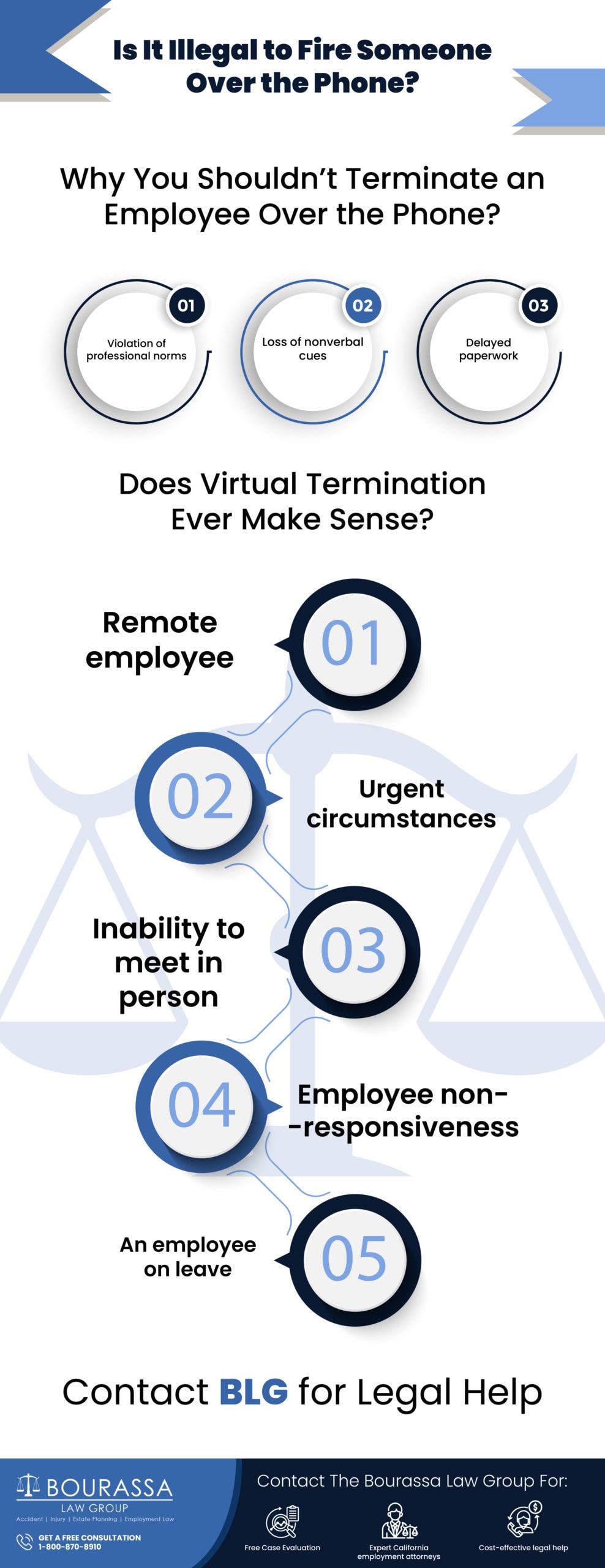
In the ever-evolving landscape of employment practices, the question of whether it is illegal to fire someone over the phone has become increasingly relevant. As technology facilitates virtual interactions, employers grapple with the challenges of maintaining professionalism and adherence to legal standards, especially when terminating an employee remotely. In this article, we delve into the nuances of ”Can an employer fire You By Phone?”, the potential legal ramifications, and the best practices for employers and employees.
What Are the Reasons for Avoiding Termination of an Employee via Phone?
Terminating an employee holds significant weight regarding legality and preserving professional norms and ethical considerations. Let’s explore why terminating employees over the phone or video conference may not be the best action.
Violation of Professional Norms:
One of the primary reasons to avoid terminating an employee over the phone is the potential violation of professional norms. Face-to-face communication has long been considered the standard for such delicate matters, allowing for a more compassionate and empathetic exchange. Terminating someone through a virtual medium may be perceived as impersonal and callous, potentially tarnishing the employer’s reputation.
Loss of Nonverbal Cues:
Nonverbal cues are crucial in communication, especially during emotionally charged conversations. The absence of face-to-face interaction eliminates the ability to gauge the employee’s immediate reactions, making it challenging to address concerns, provide support, or handle unexpected emotional responses effectively.
Delayed Paperwork:
Terminating an employee involves a series of paperwork, including severance agreements, exit interviews, and other essential documents. Conducting the termination remotely may lead to delays in processing this paperwork, potentially causing administrative challenges and leaving loose ends in terms of legal obligations.
Does Virtual Termination Ever Make Sense?
While terminating an employee over the phone or in a video conference is generally discouraged, certain situations may warrant virtual termination. Let’s explore scenarios where virtual termination may be considered acceptable:
Remote Employee:
For a remote employee who works from a different geographical location, terminating them in person may not be feasible. A virtual termination may be a practical solution in such situations, provided it is handled with sensitivity.
Urgent Circumstances:
Some situations arise where waiting for a face-to-face meeting is not feasible. Urgent matters such as gross misconduct, ethical violations, or severe breaches of company policies may necessitate immediate action, even if it means terminating an employee over the phone.
Inability to Meet in Person:
If an employee is physically unable to meet in person due to health or logistical reasons, virtual termination may be the only viable option. In such cases, employers should ensure a respectful and considerate termination process.
Employee Non-Responsiveness:
If an employee has stopped reporting to work, failed to respond to communication attempts, or is unresponsive to attempts to schedule an in-person meeting, terminating them over the phone may be the only practical option.
An employee on Leave:
When an employee is on extended leave and unable to return to work, virtual termination may be a pragmatic approach, ensuring timely resolution of employment matters.
Is It Illegal to Fire Someone Over the Phone?
The legality of firing someone over the phone varies depending on jurisdiction and employment laws. In many places, there are no specific laws prohibiting termination over the phone, but it is generally considered more professional and respectful to conduct terminations in person. Some situations, such as mass layoffs, may have different considerations.
Best Practices When Terminating an Employee Over the Phone
While virtual termination may be justifiable in certain scenarios, employers must adhere to best practices to minimize legal risks and maintain professionalism. Here are key considerations when terminating an employee over the phone:
Review Employment Contract: Before proceeding with virtual termination, thoroughly review the employment contract or employee manual. Ensure that termination over the phone does not violate any contractual obligations, and be prepared to provide clear reasons for termination in alignment with the contract terms.
Provide Written Documentation: Follow up the phone termination with written documentation, including a formal termination letter outlining the reasons for termination, details of any severance pay, and information about the return of company property. This documentation is a crucial employee’s record in case of legal challenges.
Involve Human Resources: Collaborate with the human resources department throughout the termination process. HR professionals can provide guidance on legal compliance, assist with paperwork, and ensure that the termination process aligns with company policies.
Consider Other Employees: Be mindful of the impact of virtual termination on other employees. Communicate the decision carefully to prevent unnecessary panic or uncertainty among the remaining staff members. Transparency can help maintain trust within the team.
Utilize Video Calls When Possible: While phone calls are a common medium for virtual termination, consider using video calls when possible. Video conferencing allows for a more personal connection, enabling employers to convey empathy and compassion effectively.
Follow Company Policies: Adhere to established company policies and procedures during the termination process. Consistency in applying policies helps mitigate the risk of wrongful termination claims and ensures fairness in the treatment of employees.
Certified Letter for Documentation: In addition to electronic communication, send a certified letter confirming the termination details. This provides an extra layer of documentation and ensures that the employee receives the necessary information.
Consider Unemployment Benefits: Provide information to the terminated employee about filing for unemployment benefits. Communicate any eligibility criteria and offer assistance in navigating the application process.
Why Hire an Attorney for Virtual Termination?
Terminating an employee over the phone comes with legal complexities, making the guidance of an attorney essential. Here’s why:
Legal Compliance: Employment laws vary, and an attorney ensures that the termination process aligns with local and federal regulations.
Mitigating Legal Risks: Attorneys identify and minimize legal risks, reducing the likelihood of wrongful termination claims or other legal challenges.
Ensuring Fair Treatment: Attorneys ensure a fair and equitable termination process, adhering to employment laws and preventing discrimination claims.
Reviewing Severance Agreements: Attorneys help draft, review, or negotiate severance agreements, ensuring legality and mutual benefit.
Guidance on Communication: Attorneys provide strategies for clear communication during termination, minimizing legal liabilities.
Handling Unemployment Claims: Attorneys guide future employers on navigating unemployment claims, ensuring compliance with relevant regulations.

Contact BLG for Legal Help
In conclusion, while terminating an employee over the phone or in a video conference is generally discouraged due to the potential legal and ethical implications, virtual termination may be the only viable option. Employers must approach this process with sensitivity, adherence to legal standards, and a commitment to maintaining professionalism.
Understanding the specific scenarios where virtual termination may be acceptable and following best practices can help mitigate legal risks and preserve the employer’s reputation. By considering the unique circumstances of each case and prioritizing clear communication, employers can navigate the complexities of virtual termination while minimizing the impact on both the departing employee and the remaining workforce.
Are you facing uncertainties about terminating an employee over the phone? BLG is here to provide expert guidance tailored to your specific situation. Our team of experienced employment law attorneys understands the complexities of virtual termination and can offer insights to ensure you navigate the process legally and ethically.
Contact us today for a free consultation.
FAQs
Is it OK to fire someone over the phone?
While it is generally considered more respectful and professional to conduct terminations in person, there may be situations where terminating someone over the phone is unavoidable. However, it is essential to consider the circumstances, the employee’s location, and the nature of the employment relationship. Whenever possible, opt for face-to-face communication to show empathy and respect.
How do you terminate an employee over the phone script?
When terminating an employee over the phone, it’s crucial to be clear, concise, and empathetic. Begin by explaining the reason for the termination, providing any necessary details, and expressing gratitude for their contributions. Offer support or resources for their transition, and be open to answering questions. Avoid using a script verbatim, but use key points to guide the conversation. Ensure the tone is professional and respectful.
Can you legally fire someone over text?
Terminating an employee via text is generally not recommended due to the lack of professionalism and potential misunderstandings. Moreover, employment laws and regulations may require certain documentation and procedures for terminations. Following established protocols, such as providing written notice and holding a discussion, is advisable to comply with legal requirements and maintain a respectful approach.
Can you fire someone remotely?
Yes, it is possible to terminate employees remotely. Many terminations have occurred virtually with the rise of remote work, especially during the COVID-19 pandemic. However, it’s important to handle remote terminations with care. Choose a secure and private communication method, such as a video call, and follow the same principles of clear communication, empathy, and professionalism as you would in an in-person termination. Additionally, be mindful of any legal requirements specific to the jurisdiction in which the employee works.





